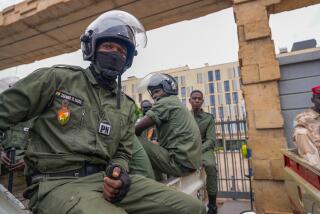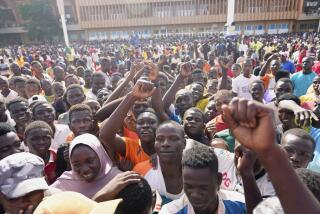Nigeria’s Woes Compounded by Dissident’s Death
- Share via
NAIROBI, Kenya — As fatal rioting rocked Nigeria and its military leader dissolved his Cabinet, analysts said Wednesday that the death of Moshood Abiola, the nation’s most prominent political prisoner, has complicated and probably delayed prospects for a peaceful push for democracy there.
Foes of the Nigerian military regime, observers said, now must scramble to find another figurehead for their struggle against political and civil injustice, after Abiola died Tuesday from what was apparently a heart attack. He fell ill during a meeting with visiting top American diplomats.
Opponents of the military junta, which annulled a 1993 presidential vote that Abiola, 60, was widely believed to have won, “have been dealt a great blow [by his] death even though not all may have supported him,” said Jean Herskovits, an expert on the West African nation at the State University of New York. “He was a perfect rallying cry. Now, they have lost that.”
Still, tensions ran high Wednesday. Abiola’s family angrily demanded that international experts perform an autopsy. And rioting broke out in Lagos, Nigeria’s main city, and other towns in Abiola’s southwestern home region, as mostly ethnic Yoruba protesters accused the Hausa-dominated military regime of murdering the wealthy businessman, who had been imprisoned since 1994. At least 20 people were reported killed.
“The suspicion toward the military has been exacerbated by” Abiola’s death, said a Lagos-based Western diplomat. “It is possible things could go badly wrong.”
A business tycoon turned politician, Abiola in recent days had reportedly renounced his claim to the presidency, as the junta had required before it would release him. But supporters refuse to believe that he would have done that.
The popularity of Abiola, a Yoruba and the first southerner to win support across a broad spectrum of the country’s fractious ethnic regions, had made the military uneasy. But Gen. Abdulsalam Abubakar--who became Nigeria’s leader after Gen. Sani Abacha, the nation’s last dictator, died last month, also of a heart attack--had moved to defuse political tensions by promising to release Abiola.
Abubakar had told visiting U.N. Secretary-General Kofi Annan that Abiola would be freed as early as this week. Many Abiola supporters had hoped that he would then be appointed to head a transitional, national unity government.
The optimists had envisioned a scenario in which Abiola--unlike Abacha, who said the junta would hand over power to an elected government but then maneuvered so he was the lone presidential contender--would have supervised fresh, free elections.
Without him, there is no individual of stature for democracy advocates to coalesce around, and the opposition, analysts said, will probably stagger blindly for a time.
“You don’t have any big name to step into Abiola’s shoes,” said Baffour Ankomah, deputy editor of the New African, a monthly newsmagazine headquartered in London. “There is a vacuum. There is going to be a lot of fighting before anyone emerges.”
As for Abubakar, who has won international praise for freeing dozens of political prisoners in his first month in office, he has promised to stick to his predecessor’s timetable to restore civilian rule by Oct. 1. He had been expected to announce his program for a transition to democratic rule this week.
But in a speech on Nigerian state television Wednesday evening, he made no mention of any plan to free the country’s remaining prisoners, nor of any concrete political measures to restore democracy.
Abubakar did say that an autopsy will be conducted in cooperation with the Abiola family and that pathologists were being flown in from the U.S., Canada and Britain.
It was unclear what the effect will be of his dissolution Wednesday of the Cabinet he inherited from Abacha, as Abubakar left intact the core of the junta that rules the oil-rich yet impoverished nation.
Some analysts maintain that setting the Oct. 1 deadline for the hand-over from the junta to an elected government was ill advised; recalling the terrible toll from the nation’s civil war in the late 1960s, they warned that rushing toward civilian rule in this emotionally charged period could be dangerous. Meanwhile, military hard-liners, eager to hang on to their privileges, have reportedly already accused Abubakar of “going soft” over the release of detainees.
Ankomah, the editor, suggested that Nigerian leaders must agree to “a cooling-off period of one year . . . so that a process of democratic transition could go through and credible parties and personalities can emerge.”
Abubakar supporters have praised what they see as progressive steps by his regime: Besides freeing political prisoners, he has fired several Abacha cronies from government posts and increased the amount of crude oil for domestic consumption by 20% to ease fuel shortages.
Still, critics say it is too early to embrace Nigeria’s newest strongman, who has much to do before he can be acclaimed by his beleaguered people.
“A lot of people have been hurt by the [political] process,” said Dan Agbese, editor of Newswatch, a Lagos-based weekly magazine. “They are going to need some assurances. There are no easy choices in this.”
More to Read
Sign up for Essential California
The most important California stories and recommendations in your inbox every morning.
You may occasionally receive promotional content from the Los Angeles Times.














